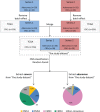Consensus molecular subtype classification of colorectal adenomas
- PMID: 29968252
- PMCID: PMC6221003
- DOI: 10.1002/path.5129
Consensus molecular subtype classification of colorectal adenomas
Abstract
Consensus molecular subtyping is an RNA expression-based classification system for colorectal cancer (CRC). Genomic alterations accumulate during CRC pathogenesis, including the premalignant adenoma stage, leading to changes in RNA expression. Only a minority of adenomas progress to malignancies, a transition that is associated with specific DNA copy number aberrations or microsatellite instability (MSI). We aimed to investigate whether colorectal adenomas can already be stratified into consensus molecular subtype (CMS) classes, and whether specific CMS classes are related to the presence of specific DNA copy number aberrations associated with progression to malignancy. RNA sequencing was performed on 62 adenomas and 59 CRCs. MSI status was determined with polymerase chain reaction-based methodology. DNA copy number was assessed by low-coverage DNA sequencing (n = 30) or array-comparative genomic hybridisation (n = 32). Adenomas were classified into CMS classes together with CRCs from the study cohort and from The Cancer Genome Atlas (n = 556), by use of the established CMS classifier. As a result, 54 of 62 (87%) adenomas were classified according to the CMS. The CMS3 'metabolic subtype', which was least common among CRCs, was most prevalent among adenomas (n = 45; 73%). One of the two adenomas showing MSI was classified as CMS1 (2%), the 'MSI immune' subtype. Eight adenomas (13%) were classified as the 'canonical' CMS2. No adenomas were classified as the 'mesenchymal' CMS4, consistent with the fact that adenomas lack invasion-associated stroma. The distribution of the CMS classes among adenomas was confirmed in an independent series. CMS3 was enriched with adenomas at low risk of progressing to CRC, whereas relatively more high-risk adenomas were observed in CMS2. We conclude that adenomas can be stratified into the CMS classes. Considering that CMS1 and CMS2 expression signatures may mark adenomas at increased risk of progression, the distribution of the CMS classes among adenomas is consistent with the proportion of adenomas expected to progress to CRC. © 2018 The Authors. The Journal of Pathology published by John Wiley & Sons Ltd on behalf of Pathological Society of Great Britain and Ireland.
Keywords: adenoma; colon; colorectal cancer; neoplasia; rectum.
© 2018 The Authors. The Journal of Pathology published by John Wiley & Sons Ltd on behalf of Pathological Society of Great Britain and Ireland.
Figures



Similar articles
-
Molecular characterization of colorectal adenomas reveals POFUT1 as a candidate driver of tumor progression.Int J Cancer. 2020 Apr 1;146(7):1979-1992. doi: 10.1002/ijc.32627. Epub 2019 Aug 30. Int J Cancer. 2020. PMID: 31411736 Free PMC article.
-
Colorectal premalignancy is associated with consensus molecular subtypes 1 and 2.Ann Oncol. 2018 Oct 1;29(10):2061-2067. doi: 10.1093/annonc/mdy337. Ann Oncol. 2018. PMID: 30412224 Free PMC article.
-
Consensus molecular subtype transition during progression of colorectal cancer.J Pathol. 2023 Nov;261(3):298-308. doi: 10.1002/path.6176. Epub 2023 Sep 8. J Pathol. 2023. PMID: 37681286
-
Molecular pathological classification of colorectal cancer.Virchows Arch. 2016 Aug;469(2):125-34. doi: 10.1007/s00428-016-1956-3. Epub 2016 Jun 20. Virchows Arch. 2016. PMID: 27325016 Free PMC article. Review.
-
Back to the Colorectal Cancer Consensus Molecular Subtype Future.Curr Gastroenterol Rep. 2019 Jan 30;21(2):5. doi: 10.1007/s11894-019-0674-9. Curr Gastroenterol Rep. 2019. PMID: 30701321 Free PMC article. Review.
Cited by
-
Genomic landscape of colorectal carcinogenesis.J Cancer Res Clin Oncol. 2022 Mar;148(3):533-545. doi: 10.1007/s00432-021-03888-w. Epub 2022 Jan 20. J Cancer Res Clin Oncol. 2022. PMID: 35048197 Review.
-
Epigenetic Alterations in the Gastrointestinal Tract: Current and Emerging Use for Biomarkers of Cancer.Gastroenterology. 2021 Feb;160(3):690-709. doi: 10.1053/j.gastro.2020.09.058. Epub 2020 Dec 3. Gastroenterology. 2021. PMID: 33279516 Free PMC article. Review.
-
Severe grade of melanosis coli is associated with a higher detection rate of colorectal adenoma.J Clin Biochem Nutr. 2022 Sep;71(2):165-171. doi: 10.3164/jcbn.22-19. Epub 2022 Aug 10. J Clin Biochem Nutr. 2022. PMID: 36213792 Free PMC article.
-
The Immune Cell Infiltration Patterns and Characterization Score in Bladder Cancer to Identify Prognosis.Front Genet. 2022 Jun 21;13:852708. doi: 10.3389/fgene.2022.852708. eCollection 2022. Front Genet. 2022. PMID: 35801082 Free PMC article.
-
Increasing Embryonic Morphogen Nodal Expression Suggests Malignant Transformation in Colorectal Lesions and as a Potential Marker for CMS4 Subtype of Colorectal Cancer.Pathol Oncol Res. 2021 Mar 10;27:587029. doi: 10.3389/pore.2021.587029. eCollection 2021. Pathol Oncol Res. 2021. PMID: 34257534 Free PMC article.
References
-
- De Sousa EMF, Wang X, Jansen M, et al Poor‐prognosis colon cancer is defined by a molecularly distinct subtype and develops from serrated precursor lesions. Nat Med 2013; 19 : 614–618. - PubMed
Publication types
MeSH terms
Substances
LinkOut - more resources
Full Text Sources
Other Literature Sources
Medical
Research Materials

